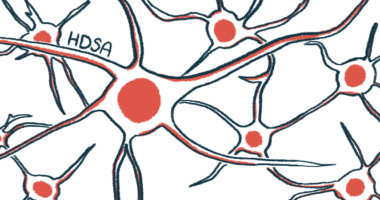Phase 1 Trial Will Test Oral PTC518 Candidate Therapy; First Results Due Early 2021

A Phase 1 trial will evaluate PTC Therapeutic’s PTC518, its investigational therapy for Huntington’s disease, in healthy volunteers, the company announced.
The trial’s first results are expected in the first half of 2021.
“The initiation of the clinical trial to evaluate PTC518 for the Huntington’s disease program is an important milestone towards identifying a potential new Huntington’s disease treatment that directly targets the underlying cause of the disease,” Stuart W. Peltz, PhD, CEO of PTC Therapeutics, said in a press release.
PTC518 is a small molecule, delivered orally, that’s designed to specifically lower the levels of mutant huntingtin (mHTT) protein — involved in Huntington’s disease and nerve cell death — by modifying a process called RNA splicing.
All genetic information contained within genes (DNA) is ultimately translated into proteins. However, several complex steps exist before a protein can be produced.
DNA is transformed into pre-messenger RNA, or pre-mRNA, which is then processed to originate a mature mRNA molecule. This process is called RNA splicing. Once mRNA molecules are produced, a process called translation begins, which gives rise to proteins.
During splicing, introns — the part of the pre-mRNA that does not code for proteins — are removed, while exons, or the part that does code, are joined together. This phenomenon allows for a single gene to give rise to many different proteins.
PTC’s investigational PTC518 therapy was developed using the company’s splicing platform. It acts by introducing a “STOP” sign during the splicing process that can trigger mHTT mRNA degradation and consequently lower its production.
The Phase 1 trial will evaluate the safety and pharmacological properties of single and multiple ascending doses of PTC518 in healthy volunteers. One main goal is to select the best dose to be tested in a future Phase 2 study. Additionally, the levels of mHTT mRNA and protein will be measured to validate RNA splicing as a therapeutic strategy.
In preclinical studies, PTC518 reduced mHTT mRNA and protein levels in a dose-dependent manner in cells isolated from patients with Huntington’s disease.
Studies in a Huntington’s mouse model, called BACHD mice, showed that oral administration of PTC518 for 21 days reduced the levels of the mHTT protein throughout the body, including in the brain, muscle, and blood.
PTC’s splicing platform has led to the discovery of Evrysdi (risdiplam) as a treatment for people with spinal muscular atrophy (SMA). Evrysdi, an approved oral small molecule, was developed in collaboration with Roche and Genentech.
“PTC518 is the only orally bioavailable small molecule therapeutic that was identified to selectively and specifically modulate Huntington’s disease splicing to reduce huntingtin protein,” Peltz said.
“Analogous to the SMA drug from our splicing platform, this trial is anticipated to establish the appropriate PTC518 dose that reduces HTT protein levels,” Peltz said. “We believe that the convenient oral administration of PTC518 has the potential to change the treatment landscape for these patients.”






